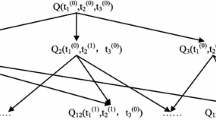Abstract
Database users may be frustrated by no answers returned when they pose a query on the database. In this paper, we study the problem of relaxing queries on RDF databases in order to acquire approximate answers. We address two problems in efficient query relaxation. First, to ensure the quality of answers, we compute the similarities between relaxed queries with regard to the user query and use them to score the potential relevant answers. Second, for obtaining top-k answers, we develop two algorithms. One is based on the best-first strategy and relaxed queries are executed in the ranking order. The batch based algorithm executes the relaxed queries as a batch and avoids unnecessary execution cost. At last, we implement and experimentally evaluate our approaches.
Similar content being viewed by others
References
Amer-Yahia, S., Cho, S., Srivastava, D.: Tree pattern relaxation. In: EDBT, pp. 496–513 (2002)
Amer-Yahia, S., Lakshmanan, L.S., Pandit, S.: FleXPath: flexible structure and full-text querying for XML. In: SIGMOD, pp. 83–94 (2004)
Bruno, N., Chaudhuri, S., Gravano, L.: Top-k selection queries over relational databases: mapping strategies and performance evaluation. ACM Trans. Database Syst. 27(2), 153–187 (2002)
Carey, M.J., Kossmann, D.: On saying “Enough Already!” in SQL. In: SIGMOD Conference, pp. 219–230 (1997)
Chen, C.M., Ling, Y.B.: A sampling-based estimator for top-k query. In: ICDE, pp. 617–627 (2002)
Christian, B., Jens, L., Georgi, K.: DBpedia—a crystallization point for the Web of Data. Web Semantics: Science, Services and Agents on the World Wide Web 7(3), 154–165 (2009)
Fagin, R., Lotem, A., Naor, M.: Optimal aggregation algorithms for middleware. In: PODS (2001)
Gaasterland, T.: Cooperative answering through controlled query relaxation. IEEE Expert 12(5), 48–59 (1997)
Guo, Y., Pan, Z., Heflin, J.: An evaluation of knowledge base systems for large OWL datasets. In: ISWC, pp. 274–288 (2004)
Hristidis, V., Koudas, N., Papakonstantinou, Ya.: PREFER: a system for the efficient execution of multi-parametric ranked queries. In: SIGMOD, pp. 259–270 (2001)
Ho, L.J.: Information retrieval based on conceptual distance in is-A hierarchies. J. Doc. 49(2), 188–207 (1993)
Houben, G., Vdovjak, R., Barna, P.: RAL: an algebra for querying RDF. World Wide Web 7(1), 83–109 (2004)
Hu, B., Hu, B.: On capturing semantics in ontology mapping. World Wide Web 11(3), 361–385 (2008)
Huang, H., Liu, C., Zhou, X.: Computing relaxed answers on RDF databases. In: WISE, pp. 163–175 (2008)
Hurtado, C.A., Al Poulovassilis, Wood, P.T.: a relaxed approach to RDF querying. In: ISWC, pp. 314–328 (2006)
Ilyas, I.F., Aref, W.G., Elmagarmid, A.K.: Supporting top-k join queries in relational databases. In: VLDB, pp. 754–765 (2003)
Jena TDB: http://openjena.org/wiki/TDB
Karvounarakis, G., Alexaki, S., Christophides, V., Plexousakis, D., Scholl, M.: RQL: a declarative query language for RDF. In: WWW, pp. 592–603 (2002)
Li, C., Chang, K.C., Ilyas, I.F.: Supporting ad-hoc ranking aggregates. In: SIGMOD, pp. 61–72 (2006)
Liu, C., Vincent, M.W., Liu, J.: Constraint preserving transformation from relational schema to XML schema. World Wide Web 9(1), 93–110 (2006)
Liu, C., Li, J., Yu, J.X., Zhou, R.: Adaptive relaxation for querying heterogeneous XML data sources. Inf. Syst. 35(6), 688–707 (2010)
Motro, A.: SEAVE: a mechanism for verifying user presuppositions in query systems. ACM Trans. Inf. Syst. 4(4), 312–330 (1986)
Motro, A.: FLEX: a tolerant and cooperative user interface to databases. IEEE Trans. Knowl. Data Eng. 2(2), 231–246 (1990)
Muslea, I.: Machine learning for online query relaxation. In: KDD, pp. 246–255 (2004)
Natsev, A., Chang, Y.C., Smith, J.R., Li, C.S., Vitter, J.S.: Supporting incremental join queries on ranked inputs. In: VLDB, pp. 281–290 (2001)
Neumann, T., Weikum, G.: RDF-3X: a RISC-style engine for RDF. PVLDB 1(1), 6470–659 (2008)
Ras, Z.W., Dardzinska, A.: Solving failing queries through cooperation and collaboration. World Wide Web 9(2), 173–186 (2006)
Resnik, P.: Using Information Content to Evaluate Semantic Similarity in a Taxonomy. In: IJCAI, pp. 448–453 (1995)
SPARQL Laguage: http://www.w3.org/TR/rdf-sparql-query/
Stocker, M., Seaborne, A., Bernstein, A., Kiefer, C., Reynolds, D.: SPARQL basic graph pattern optimization using selectivity estimation. In: WWW, pp. 595–604 (2008)
XML Schema: http://www.w3.org/XML/Schema
Author information
Authors and Affiliations
Corresponding author
Rights and permissions
About this article
Cite this article
Huang, H., Liu, C. & Zhou, X. Approximating query answering on RDF databases. World Wide Web 15, 89–114 (2012). https://doi.org/10.1007/s11280-011-0131-7
Received:
Revised:
Accepted:
Published:
Issue Date:
DOI: https://doi.org/10.1007/s11280-011-0131-7




